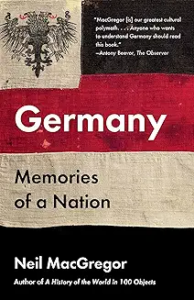Germany: Memories of a Nation by Neil MacGregor 2014
What an ambitious undertaking it was to convey the history of Germany from the defeat of the Romans by Hermann in 9 A.D. to the year in which the book was written, 2014. And who better to do that then the polymath director of the British Museum since 2002, Neil MacGregor whose previous book took the same approach to the history of the entire world.
Though I haven’t yet read that book, this one is magnificent. It’s a very heavy tome weighing in at nearly 600 pages, but it never lost my interest. MacGregor chooses objects, buildings, sculpture, paintings, jewelry, and individuals to illustrate the major developments over these 2000 years and then goes out and finds a content expert to proffer opinions and information on each topic. This approach makes for a freshness and variety lacking in so many history books. It also results in a departure from the King-this and Emperor-that approach that can be so boring in history books. Instead, MacGregor moves back and forth in time and place, and we meet artists like Durer and Riemensnyder, politicians like Bismarck, kings and emperors like Charles I (aka Charlegmagne in France), creators such as Gutenburg, Luther, Goethe, and Schiller, and ordinary citizens like the Trummerfrau, the millions of women who cleared the rubble and rebuilt the buildings destroyed in WWII.
I loved the maps, brightly colored and filled with the names of cities, states, and rivers that highlighted Germany’s borders and compostion from The Holy Roman Empire in 1500 to Modern Germany, reunited after 45 years of separation. I also developed a healthy respect for the study of history as a way of understanding the present and planning for building the future. Yes, there are dates (e.g. the HRE from 800-1805 when Napoleon defeated the Austrians at Austerlitz and the Prussians at Jena; the Thirty Years War from 1618-1648 which destroyed the German economy for centuries; the popular uprisings of 1848; the Franco Prussian War ending in 1871 with the creation of the modern German state; the defeat in WWI and end of the Empire in 1918 with its consequent reparations, inflation, and anti-semitism; the failed Weimar Republic ending in 1933 with the Reichstag fire and Hitler’s rise; the Berlin Wall separating East and West between 1961 and 1989; and finally the reunification of East and West Germany in 1990.
It’s a rather amazing and engaging story and one which I wish I had read in preparation for our recent trip to Germany. The book was recommended by our German guide, Bryan, and I am grateful to him for doing so.



